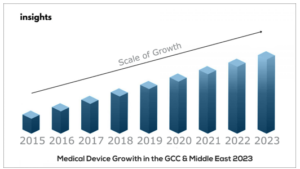In today's fast-paced world, advancements in medical technology are revolutionizing healthcare, leading to improved patient outcomes and enhanced quality of life. The medical device industry plays a crucial role in this progress, providing innovative tools and technologies to diagnose, monitor, and treat various medical conditions.
However, with progress comes the need for stringent regulations to ensure safety, efficacy, and ethical standards. This blog post delves into the significance of staying updated on regulations within the medical device industry, particularly in the GCC and Middle East region.
The medical device industry is witnessing rapid growth globally, and the GCC and Middle East regions are no exception. Increasing investments in healthcare infrastructure, rising demand for advanced healthcare services, and a growing aging population have fuelled the demand for medical devices (See graph below):

From diagnostic imaging equipment to implantable devices and wearable technology, medical devices are becoming indispensable tools in the modern healthcare landscape.
In the field of medical devices, regulatory compliance is paramount. Strict regulations and quality standards are necessary to ensure the safety and effectiveness of medical devices, protect patients and healthcare providers, and foster innovation. In the GCC various regulatory bodies oversee the medical device industry, and they are:
Saudi Food and Drug Authority (SFDA) - Saudi Arabia, Ministry of Health (MOH) - Saudi Arabia Gulf Health Council (GHC), Ministry of Health and Prevention (MOHAP) - United Arab Emirates, Dubai Health Authority (DHA) - United Arab Emirates, Abu Dhabi Health Services Company (SEHA) - United Arab Emirates, Ministry of Health (MOH) – Kuwait, Egyptian Drug Authority – Egypt, Ministry of Health (MOH) – Bahrain, Ministry of Health (MOH) – Oman, Ministry of Health (MOH) – Qatar, Jordan Food and Drug Administration – Jordan, Ministry of Health (MOH) – Lebanon, Ministry of Health (MOH) – Iraq & Ministry of Health (MOH) – Yemen.
To navigate the dynamic landscape of medical device regulations, it is essential for manufacturers, healthcare professionals, and stakeholders to stay up-to-date with the latest requirements. Here are a few key reasons why staying updated is crucial:
-
Compliance and Market Access: Adhering to regulatory requirements is essential to obtain and maintain market access for medical devices. Staying informed about changing regulations allows manufacturers to adapt their processes and ensure compliance, avoiding potential delays or barriers to market entry.
-
Patient Safety: Patient safety is at the core of medical device regulations. Being well-informed about updated regulations helps healthcare professionals and providers to make informed decisions about the devices they use, ensuring that patient safety remains a top priority.
-
Quality Assurance: Updated regulations often reflect advancements in technology, safety protocols, and best practices. By staying current, manufacturers can implement quality management systems that meet the latest standards, enhancing the overall quality and reliability of medical devices.
-
Business Opportunities: A sound understanding of regulatory requirements opens doors to new business opportunities. Regulatory compliance is often a prerequisite for partnerships, collaborations, and procurement contracts within the healthcare industry. Being proactive and knowledgeable about regulations positions businesses for success and growth.
-
Risk Mitigation: Non-compliance with medical device regulations can have severe consequences, including product recalls, legal implications, damage to brand reputation, and compromised patient safety. Staying updated on regulations helps mitigate risks by ensuring compliance and proactively addressing any changes or updates.
Keeping pace with evolving regulations requires a multifaceted approach. Here are some tools and strategies to consider:
-
Regular Monitoring: Monitor regulatory authorities websites, publications, and newsletters for updates on guidelines, standards, and regulatory changes. Stay connected to industry associations, trade shows, and conferences that provide insights into emerging trends and regulatory updates.
-
Collaboration and Networking: Engage in discussions and networking with industry peers, regulatory experts, and professionals in the field. Collaborate with regulatory consultants or legal advisors who specialize in medical device regulations to gain expert guidance.
-
Training and Education: Invest in continuous professional development and training programs that focus on medical device regulations. These courses can enhance your knowledge base, keep you informed about evolving practices, and help you understand the nuances of compliance.
-
Regulatory Intelligence Solutions: Leverage regulatory intelligence platforms or databases that consolidate and provide access to the latest regulatory information specific to the GCC and Middle East region. These tools can save time, streamline research, and provide real-time updates.
